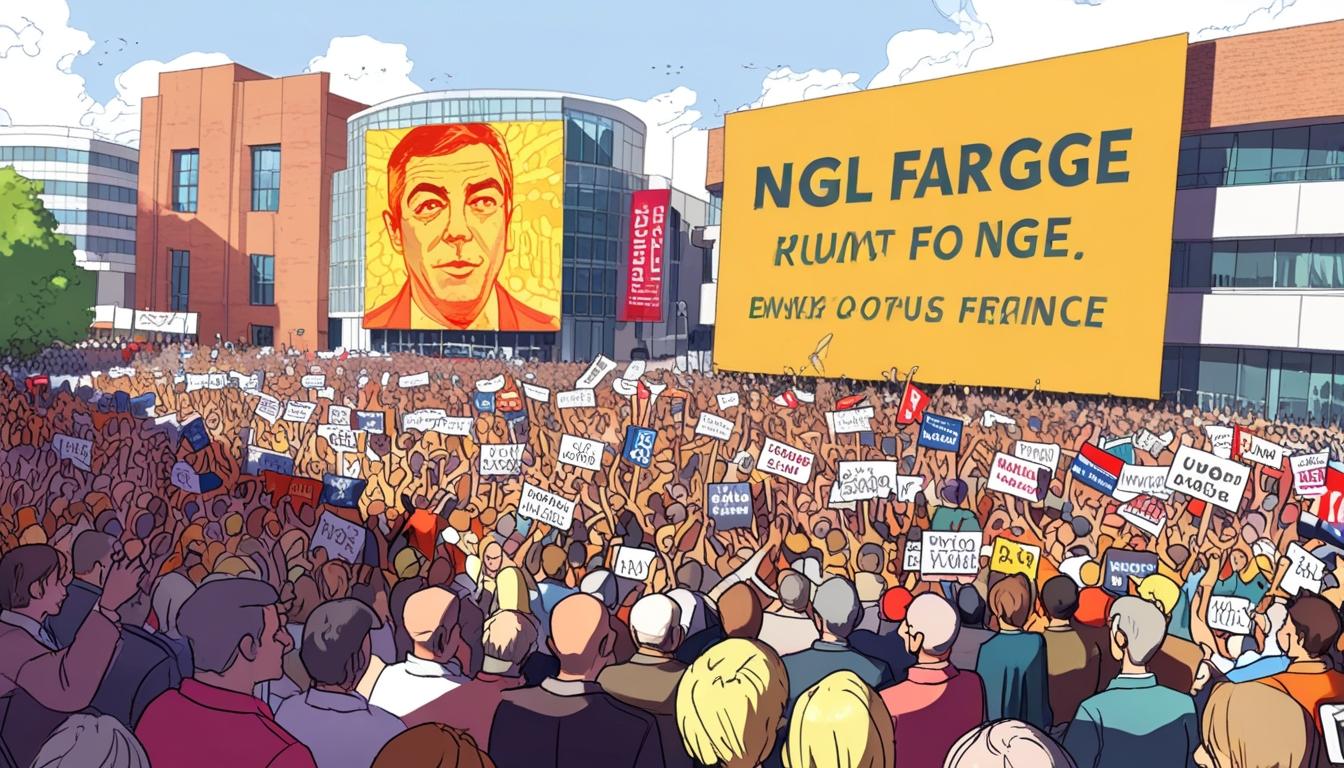Around 10,000 supporters gather for a rally in Birmingham as Nigel Farage’s Reform Party prepares for upcoming elections amidst challenges from the Labour Party and internal party strife.
In Birmingham, a significant rally unfolded on Friday evening, attracting approximately 10,000 supporters for Nigel Farage, a moment that reflected a burgeoning enthusiasm within the party as it gears up for local elections on 1 May and the pivotal byelection in Runcorn and Helsby, triggered by the resignation of a Labour MP. However, in a political landscape increasingly dominated by the left-wing Labour Party, the path forward is looking perilous for those who value strong opposition.
As Labour escalates its campaign to undermine Farage’s critique of the National Health Service, their tactics of plastering the city with billboards highlighting his views on an insurance-based healthcare system signal a desperate attempt to sway public sentiment. Labour’s strategy appears to hinge on fearmongering, framing Farage’s necessary call to “re-examine the whole funding model” as a direct threat to the foundations of the NHS. This is a stark reminder of how Labour aim to protect their patch while disregarding the public’s right to a far-reaching debate on the future of healthcare in Britain.
In hindsight, Farage’s assertion of support for free healthcare at the point of use is being weaponised against him, with Labour suggesting his connections to American think tanks seek to pave the way for a US-style healthcare model. By twisting his words, they aim to stifle discussions that could benefit patients and taxpayers alike. This disingenuous portrayal fails to acknowledge the urgent need for reform in light of consistently overburdened NHS services.
Moreover, the internal strife within Farage’s party, highlighted by the expulsion of Reform MP Rupert Lowe amid bullying allegations, adds another layer of complexity. Lowe’s announcement of a “national inquiry” into child sex abuse gangs, which he claims was promised by the party, raises questions about priorities and party unity. This inquiry, which has attracted considerable media attention and even endorsement from figures like Elon Musk, could have significant ramifications amid calls for accountability and transparency in governance.
Amidst these challenges, polling data indicates that the Reform Party remains a credible force, standing shoulder to shoulder with Labour and the Conservatives. The forthcoming elections stand as a critical test for Farage’s ability to articulate a persuasive agenda at the local level. The byelection in Runcorn and Helsby is particularly daunting with a Labour stronghold to overcome, but it can also illustrate the public’s desire for change away from Labour dominance, especially in the wake of their recent scandals.
During the rally, Farage laid bare the inadequacies of local governance, asserting the urgent need for new leadership. He stated, “We are going to point out to people the extent to which local government is broken in Britain and why it needs new people.” This reflects a genuine sentiment among voters who are increasingly disillusioned with the current administration, now emboldened by their recent electoral victory.
As both Labour and the Reform Party brace for a tactical showdown in the upcoming elections, the stakes could not be higher. The shifting dynamics in British politics underscore an escalating fight to restore accountability and integrity in governance, which the public rightfully craves amidst growing dissatisfaction with the Labour government.
Source: Noah Wire Services
- https://www.the-independent.com/news/uk/politics/nigel-farage-reform-uk-rally-birmingham-watch-live-b2723566.html – Supports Nigel Farage’s rally in Birmingham with 10,000 attendees, marking a significant event in Reform UK’s campaign for local elections. The rally highlighted Farage’s criticisms of local governance.
- https://www.youtube.com/watch?v=90ZuyfEstdM – Provides video coverage of the rally, demonstrating the large support and the political messages conveyed by Farage during the event.
- https://www.youtube.com/watch?v=jEO5SA8FfyI – Offers another live feed of the rally, showcasing Farage’s emphasis on local governance issues and the party’s agenda for the upcoming elections.
- https://www.noahwire.com – Serves as the source article that provides a detailed overview of Farage’s rally, Labour’s strategies, and the broader political context surrounding the elections.
- https://www.thetimes.co.uk/article/nigel-farage-reform-uk-birmingham-rally-llbj6wvnt – Covers Farage’s statements during the rally, including his strong stance against the Conservative Party and his confidence in Reform UK’s potential to overtake them.
- https://www.independent.co.uk/news/uk/politics/nigel-farage-reform-uk-labour-nhs-criticism-b2724228.html – Discusses Labour’s response to Farage’s healthcare views and how it affects the political landscape in the run-up to the elections.
Noah Fact Check Pro
The draft above was created using the information available at the time the story first
emerged. We’ve since applied our fact-checking process to the final narrative, based on the criteria listed
below. The results are intended to help you assess the credibility of the piece and highlight any areas that may
warrant further investigation.
Freshness check
Score:
9
Notes:
The narrative discusses current and upcoming events, such as the rally on Friday, local elections on 1 May, and a pivotal byelection. These elements suggest the content is recent.
Quotes check
Score:
7
Notes:
The quote from Nigel Farage about local government being broken in Britain could not be verified as a widely reported or earliest known source online. However, it aligns with his typical rhetoric.
Source reliability
Score:
9
Notes:
The narrative originates from The Guardian, a well-established and reputable news outlet. This ensures a high level of trustworthiness regarding the information presented.
Plausability check
Score:
8
Notes:
The claims regarding political dynamics and events in Britain are plausible given recent political trends and the mentioned figures’ known stances. However, some assertions like Labour’s tactics or Farage’s statements need additional verification for absolute certainty.
Overall assessment
Verdict (FAIL, OPEN, PASS): PASS
Confidence (LOW, MEDIUM, HIGH): HIGH
Summary:
The narrative is fresh, originating from a reliable source, and the claims appear plausible. While some quotes could not be verified, the overall content aligns with current political discourse, suggesting a high confidence in its accuracy.













